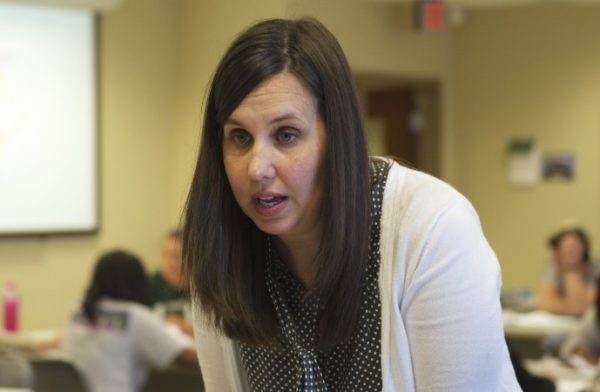Tonya Bates Honored as Teaching Award Finalist

Tonya Bates of Biological Sciences is one of three nominees for the College of Liberal Arts & Sciences Award for Outstanding Teaching by a Full-Time Lecturer. The other nominees are John Taylor of Mathematics and Statistics and Sue Hodge of Criminal Justice and Criminology.
A native North Carolinian, Bates earned a master’s degree in biology and as a graduate student taught introductory biology and microbiology labs at UNC Charlotte. After graduation, she worked as a researcher in industry, at UMASS Amherst, and at Carolinas Medical Center, which provided her with a broad range of clinical and technical skills. Along this journey, she discovered that more than doing bench research, she enjoyed sharing biology through teaching and mentoring.
Bates is currently a lecturer in the Department of Biological Sciences and recently took on the role of undergraduate coordinator. She teaches majors and non-science majors in a variety of courses including Principles of Biology, Nature of Science and Current Topics as well as Public Health for educators. The undergraduate coordinator position enables her to have an impact on the undergraduate curriculum of biology majors in a way that is not possible as an instructor.
By participating in the Communication across the Curriculum program, she has initiated improving writing in her department by facilitating the use of peer writing mentors in select writing intensive courses.
Recently she was selected to participate in the Top 40 faculty academy to write a resource guide for new faculty in these large enrollment freshman courses. In her spare time, she promotes science in the community by participating in events such as the UNC Charlotte Science and Technology Expo and Science Olympiad. With colleagues, she continues to develop many professional development workshops for middle, high school, and AP biology teachers.
She describes her teaching philosophy as “student-centered” and she strives to use a range of engagement strategies including low-stakes formative assessment, hand-on activities, and small group exercises. Her goal is to make students scientifically literate. One student nominator said this: “She is able to make small group projects work in a large class of 200 students, which seems like a magic trick to me.” Another student nominator said that “Professor Bates constantly gives creative analogies and finds ways to link what we are learning in class to our own lives. She is truly a phenomenal professor.”